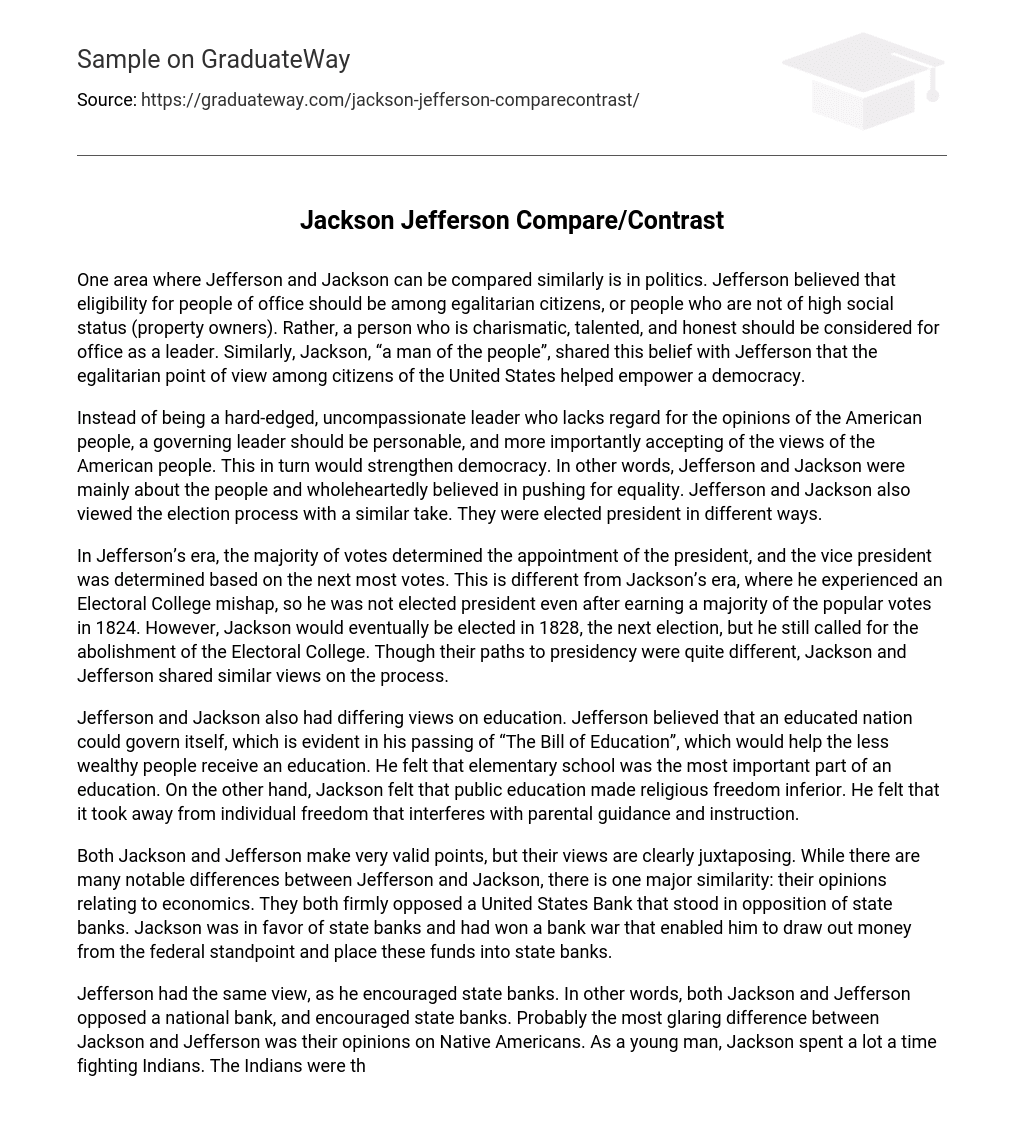Both Jefferson and Jackson shared similar views in politics. They believed that individuals who were charismatic, talented, and honest should be considered for leadership positions, regardless of their social status as property owners. Jefferson advocated for the eligibility of egalitarian citizens, while Jackson, known as “a man of the people,” also believed in empowering democracy through the egalitarian point of view among citizens of the United States.
A leader who lacks compassion and disregards the opinions of the American people should be replaced by a leader who is personable and accepting of different views. This would enhance democracy. Essentially, Jefferson and Jackson prioritized the people and advocated for equality. Moreover, they had a similar approach to the election process despite being elected president differently.
During Jefferson’s time, the president was elected based on the majority of votes, while the vice president was chosen by the next highest number of votes. However, Jackson faced a setback with the Electoral College during his era. This resulted in him not being elected as president in 1824 despite having more popular votes than any other candidate. Nonetheless, he eventually won the subsequent election in 1828 and remained an advocate for abolishing the Electoral College system. Despite their divergent paths to presidency, Jackson and Jefferson held comparable perspectives on conducting elections.
Jefferson and Jackson held contrasting perspectives on education. Jefferson subscribed to the belief that a well-informed society could effectively govern itself, as reflected in his enactment of “The Bill of Education” aimed at providing educational opportunities to those from lower socio-economic backgrounds. He emphasized the significance of elementary schooling within the realm of education. On the contrary, Jackson viewed public education as detrimental to religious liberty, perceiving it as impeding individual freedom and encroaching upon parental guidance and instruction.
While Jefferson and Jackson have differing views, they both share a common perspective on economics. They both opposed a national bank that challenged state banks. Jackson successfully waged a bank war and transferred federal funds to state banks, aligning with his support for state banks.
Both Jackson and Jefferson held similar views regarding state banks, as they both opposed the establishment of a national bank and instead advocated for state banks. However, the most notable distinction between Jackson and Jefferson lied in their stances towards Native Americans. While Jackson had a history of actively fighting against Native Americans in his youth, as they posed a constant threat to white settlers through surprise attacks resulting in the destruction of homes and loss of lives.
Despite Jackson’s negative view of Indians, Jefferson had a different perspective. Jefferson, who had firsthand knowledge of Indian life on the frontier, disagreed with Buffon’s ignorant opinions. Buffon, a Frenchman, claimed that compared to Europeans, Indians were physically weaker, less sensitive, timid, cowardly, lacking in vivacity and mental activity. However, based on his personal experience with Indians, Jefferson strongly contradicted Buffon’s beliefs.
He held the individuals in high regard, commending their numerous positive attributes. Both Jefferson and Jackson played pivotal roles in establishing the foundation of United States Democracy. They shared comparable political and economic ideologies, although their perspectives diverged on education and Indians. Ultimately, both men would be remembered as influential figures in the history of our nation. It is crucial to acknowledge their importance, as their commonalities and disparities shaped them into exceptional American leaders.





